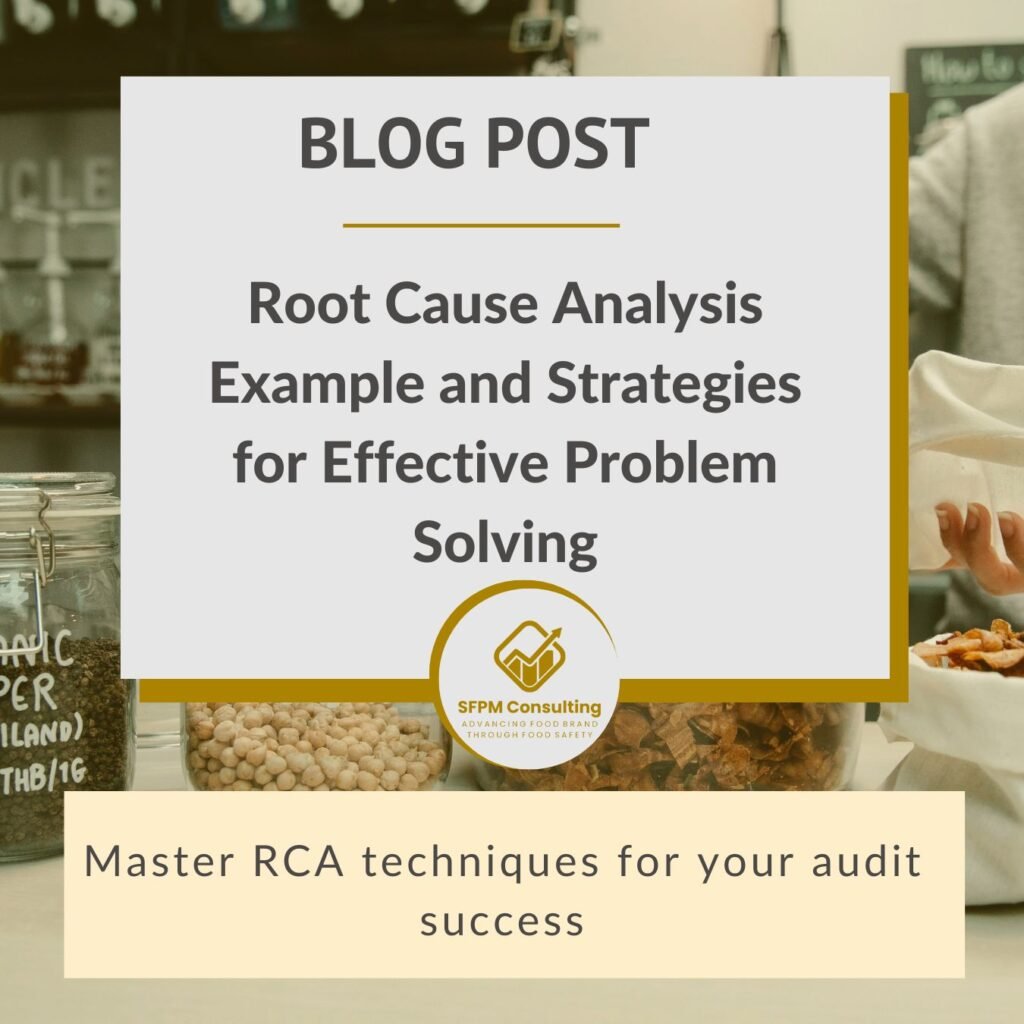In the dynamic world of food manufacturing, you cannot avoid deviations. One of the most effective tools to achieve this is Root Cause Analysis (RCA). By identifying the underlying causes of deviations and implementing corrective actions, RCA helps prevent recurrence and ensures the production of safe, high-quality food. This blog post will delve into the importance of root cause analysis, explore various RCA strategies, including the 5 Whys, and provide practical examples from the food manufacturing industry.
Understanding Root Cause Analysis
Root cause analysis is a systematic process commonly used to identify the fundamental reasons behind deviations or problems. In food manufacturing, deviations can range from contamination to equipment failure, each posing significant risks to food safety. By pinpointing the root cause, we can implement targeted corrective actions, reducing the likelihood of recurrence and enhancing overall safety protocols.
The Importance of Root Cause Analysis in Food Safety
The significance of root cause analysis in food safety cannot be overstated. RCA helps identify and rectify issues and improve processes and systems. By addressing the root cause, manufacturers can ensure that the same problem does not recur, safeguarding consumer health and maintaining regulatory compliance. Additionally, RCA fosters a culture of continuous improvement, encouraging proactive measures rather than reactive fixes.
Common RCA Strategies in Food Manufacturing
Several strategies can be employed to conduct root cause analysis in food manufacturing. Among the most popular are the Fishbone Diagram, Failure Mode and Effects Analysis (FMEA), and the 5 Whys technique. Each strategy offers unique advantages and can be chosen based on the specific nature of the deviation or issue at hand. In this blog, we will focus on the 5 Whys Techniques.
The 5 Whys Technique
The 5 Whys technique is a simple yet powerful RCA strategy that involves asking “why” five times to drill down to the root cause of a problem. This method is particularly effective in food manufacturing, where deviations can often be traced back to human error, process flaws, or equipment malfunctions. By persistently questioning the cause, manufacturers can uncover the underlying issue and implement effective corrective actions.
Practical Examples of Root Cause Analysis in Food Manufacturing
To illustrate the application of root cause analysis, consider a scenario where a batch of food products is found to be contaminated.
Using the 5 Whys technique, the investigation might proceed as follows:
1. Why was the batch contaminated? Because a foreign substance was found in the product.
2. Why was the foreign substance present? Because it entered during the mixing process.
3. Why did it enter during the mixing process? Because the mixer was not properly cleaned.
4. Why was the mixer not properly cleaned? Because the cleaning protocol was not followed.
5. Why was the cleaning protocol not followed? Because staff were not adequately trained.In this example, the root cause is inadequate staff training, leading to the implementation of a comprehensive training program to prevent future occurrences.
Whenever you have multiple whys, make sure you also address all the whys! You can continue to use as many Whys as needed until you find the bottom line of the deviations or root cause.
Implementing Effective RCA Strategies
To effectively implement RCA strategies, we recommend that food manufacturers establish a structured approach that includes assembling a cross-functional team, gathering data, analyzing findings, and developing corrective actions. Regular training and continuous monitoring are also crucial to ensure the sustainability of improvements and adherence to food safety standards.
Repeated issues? Or do you need help getting the right root cause? We help food manufacturers and our clients learn how to find the right root cause analysis and document them. To get started, please Find a Time with Felicia Loo, and we can help you with your day-to-day deviations, internal audit deviations or audit deviations. Let’s solve your non-conformances and deviation challenges.
Benefits of Root Cause Analysis in Food Manufacturing
The benefits of conducting root cause analysis in food manufacturing extend beyond immediate problem resolution. RCA enhances operational efficiency, reduces waste, and improves product quality. It also helps build consumer trust by demonstrating a commitment to food safety and quality assurance. Moreover, RCA can save costs by preventing costly recalls and regulatory fines.
Root cause analysis is an indispensable tool in the realm of food safety. By systematically identifying and addressing the underlying causes of deviations, food manufacturers can ensure the production of safe, high-quality products. Employing effective RCA strategies, such as the 5 Whys, and learning from practical examples can significantly enhance food safety protocols. Ultimately, a robust RCA process fosters a culture of continuous improvement, ensuring that food manufacturing operations remain safe, efficient, and compliant.

